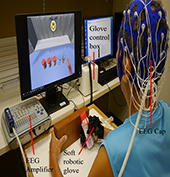Brain-Computer Interface-based Soft Robotic Glove Rehabilitation for Stroke
https://www.embs.org/tbme/wp-content/uploads/sites/19/2020/11/TBME-01937-2019-Highlight-Image.jpeg
170
177
IEEE Transactions on Biomedical Engineering (TBME)
//www.embs.org/tbme/wp-content/uploads/sites/19/2022/06/ieee-tbme-logo2x.png
This paper presents the results of a study involving the use of a Brain-Computer Interface-based Soft Robotic Glove as a novel strategy in stroke rehabilitation. The technology uses the electroencephalogram signals from stroke patients to drive the assistive actions of the soft robotic glove to assist them in physically carrying out activities of daily living. The two-arm study showed prolonged improvements in FMA and ARAT scores although no significant intergroup differences were observed during the study. In addition, all of the patients in the BCI-SRG group also experienced a vivid kinesthetic illusion lasting beyond the active intervention period.
read more

